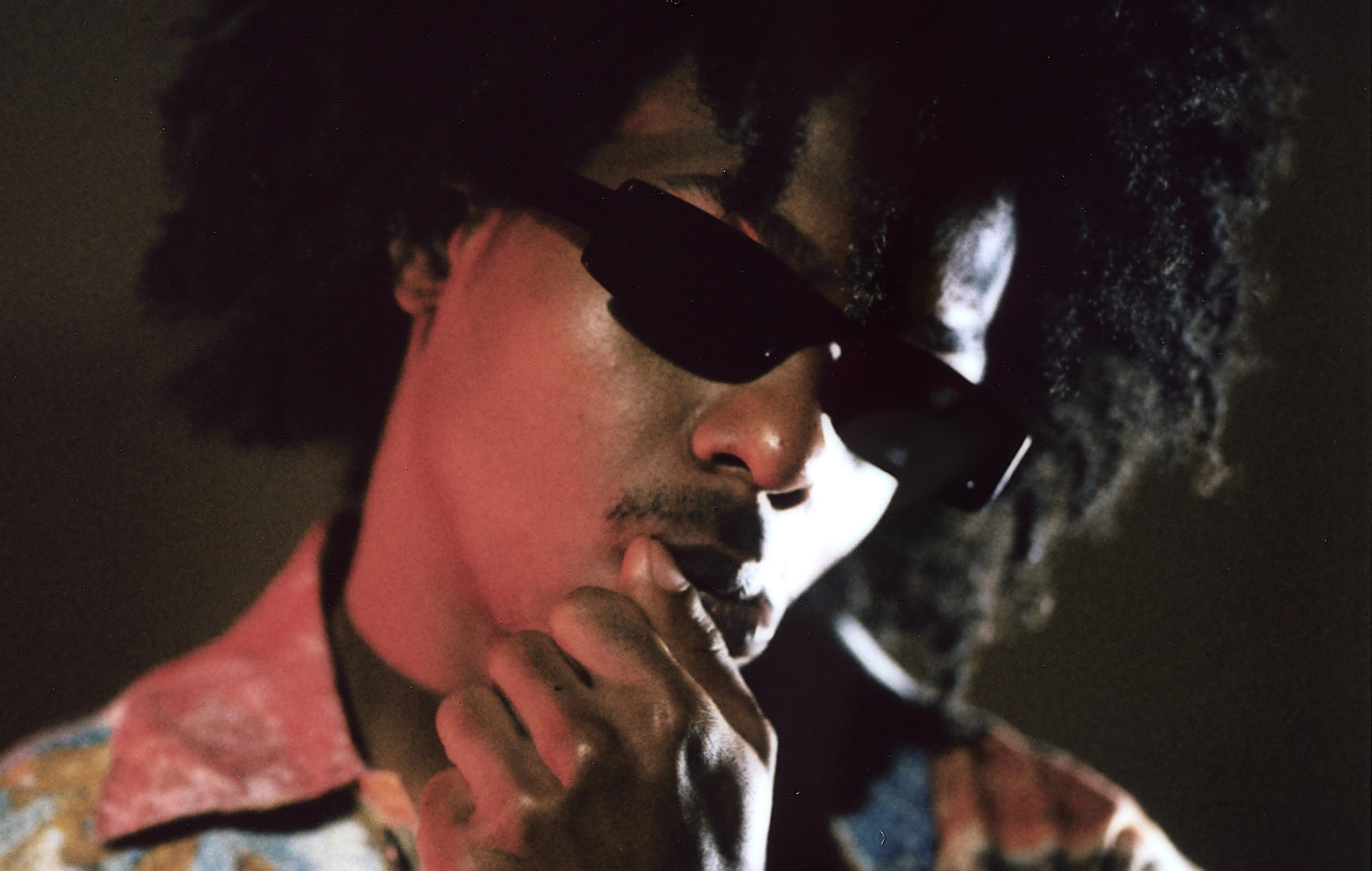“Unapologetic love”: that’s what got Berwyn through his darkest times. Growing up in the UK as an undocumented immigrant was a complex and traumatic experience for the Trinidad-born, Romford-raised singer, rapper, producer, and instrumentalist. To this day, there’s anger coursing through his veins for the architects of Britain’s hostile environment policy, for the racists and bigots who targeted him when he was a kid. All that suffering could have crushed the firmest of spirits, but Berwyn Du Bois managed to keep going.
Berwyn on The Cover of NME. Credit: Tamiym for NME
“There’s something about what I’ve experienced through love, both romantically and otherwise, that has empowered me in this fuckery,” he says. “In [the song] ‘Neighbours’, when I say ‘Fuck the neighbours, turn the music up’, I’m blocking out the noise and experiencing my experience to the fullest through the lens of love. I’m experiencing that liberation and carelessness you only get from love.”
When NME meets Berwyn on a drizzly summer morning in north London, that energy is clear to see. He lifts the mood when he walks into the room, smiling broadly and joking that he’d rather be in the studio. An unsurprising sentiment for this serious grafter. Following the release of his Mercury Prize-nominated debut mixtape ‘Demotape/Vega’ in 2021, he wasted no time in fleshing out his raw, confessional brand of hip-hop with the follow-up project ‘Tape 2/Fomalhaut’. The strength of these early efforts netted him a Best New Act win at the 2022 BandLab NME Awards, and since then, he’s been cooking up a debut record – one that expresses his belief in the power of love.
Considering the hand he’s been dealt in life, this perspective is admirable. In his 28 years, Berwyn has experienced homelessness, poverty and state persecution, and come out the other side. His debut album ‘Who Am I’, released last Friday (July 12), documents those ebbs and flows with heart, nuance, and creative flair.
“There’s something about what I’ve experienced through love that has empowered me in this fuckery”
As the title suggests, the album is an unfiltered and deeply introspective breakdown of his identity and the forces that have shaped it. Its 12 songs crackle with vibrancy and life, from the frequent microphone scuffles and snippets of background noise to the recordings of his parents’ voices that flesh out the context of his upbringing and family dynamics. Those raw, unpolished moments are imprinted onto a soundscape that’s his attempt to “understand hip-hop’s trajectory and take it to more electronic, futuristic places”. The result is a record that firmly conveys the essence of Berwyn as a man and as an artist.
A key thread running through ‘Who Am I’ is Berwyn’s perception of himself being shaped by hostile immigration policy. Since moving to the UK aged nine, his life has been continually unstable, one of the few consistencies the loss of opportunities due to his immigration status. From being unable to visit New York and star in a youth performance of the musical The Lion King, to having to turn down unconditional university offers and make excuses to teachers due to the fact he didn’t have the correct papers, he’s repeatedly faced barriers while striving for excellence.
Credit: Tamiym for NME
“I was always trying to do the right thing,” Berwyn says. “I was just a child with dreams, and I excelled at everything I did, and that mattered nothing. My music teacher wanted me to go to BRIT School, but I couldn’t go because of my papers, so I had to tell them ‘I woke up late’ or ‘I didn’t do this’. That person never looked at me the same! And it’s happening right now to good youts, and you’re gonna make monsters out of them. It’s evil.”
Today, Berwyn has discretionary leave to remain in the UK, after being placed in a category of immigration status “intended to cover exceptional and compassionate circumstances” where individuals “do not meet the requirements of the Immigration Rules”. In reality, this category has become a way of extracting money from vulnerable individuals while stripping them of certain rights as citizens, Berwyn argues.
“You have the right to work and exist in the country, but you can’t claim any benefits from the state, and every three years you have to pay £3,000 and have your case reviewed,” he says. “It’s a scam. One day ITV or Channel 4 will make a documentary on it, but by that point, they will already have extorted hundreds of millions from vulnerable individuals all over the world from colonies the UK has destabilised themselves.”
“I was just a child with dreams. I excelled at everything I did, and that mattered nothing”
‘Who Am I’ rails against this kind of inequality and oppression. In ‘I Am Black’, Berwyn raps “How come me and my brother were born in the gutter? How come everyone there was a similar colour? Do you fight for one side and not for the other?” On ‘Mama’, a poignant melodic hip-hop tribute to his mother, he untangles the complexities of experiencing love and suffering in tandem, lines like “getting chased by the feds while you play with my hair” capturing the dualities that shaped his youth.
Arguably the album’s most powerful track is ‘Dear Immigration’, a two-and-a-half-minute a cappella track in which Berwyn reads out a poetic letter describing the pain and strife inflicted on him by the Home Office. Breaking down the many tribulations and indignities he and his family have faced since moving to the UK, he vents: “Today my little brother said he wants to sell drugs and I hate you for that, I really blame you for that, how was he born in this country but still needs papers and that?”
Credit: Tamiym for NME
Berwyn dropped an emotional black-and-white video of himself reading out the letter, and the YouTube comments highlight the deep impact ‘Dear Immigration’ has had on those with similar experiences. One fan writes, “Damn, I wish these verses were around 20 years ago when I was an undocumented kid.” How do comments like that make Berwyn feel?
“I did it for the mandem and the galdem that are going through it,” he says. “We’re living in a really tense environment in Britain at the moment, probably the most tense since Brexit, racially and class-wise… I was finding a lot of irrational hate, even in response to tracks like ‘Neighbours’, from vocal nationalistic individuals, so I haven’t read the comments, because that’s not what I did it for. I did that therapy for me, and I gave that to the world for someone else.”
This is one example of the unapologetic love Du Bois treats as “one of my tools to get through it.” There are other tools across ‘Who Am I’, like the reactionary anger and venom expressed in the ambient, soulful ‘Hate’: “I hate the government, I hate police / ’Cause they hate me”. “There’s as much negativity as there is positivity in this body of work,” he explains. “There’s loads of hate, and disappointment and aggression. It’s a natural aggression, and it comes from my body strategising without my conscious thought.”
Credit: Tamiym for NME
Tracks like ‘Hate’ and ‘Dear Immigration’ reflect Berwyn’s fierce sense of political awareness, which is evident throughout his conversation with NME. Not only does he express a strong understanding of the suffering caused by right-wing government policy, he also views almost every aspect of popular culture through the prism of politics.
“There will always be a right viewpoint and a left viewpoint,” he says. “It’s how culture performs, and it was expressed perfectly in Kendrick vs Drake recently. Hip-hop is the biggest genre in the world and it has dualised itself completely. Those on the left of centre were pro-Kendrick, while all the right of centre blog pages, which are misogynistic, they’re pro-Drake. No matter what, culture will always dissect itself, and I ain’t missing that one.”
“I’m pushing Black music into the future”
This perspective has had an impact on Berwyn’s most recent trips to Trinidad. These days, he tries to visit his country of birth at least once a year, seeing family and connecting with local artists such as Brooklyn Decent, who contributed to ‘Who Am I’.
“I went out to work with Brooklyn because I want to develop this left of centre market in Trinidad,” he says. “I miss Black culture’s left heyday – I think we won our fight and then we stopped fighting. There’s a massive left of centre void in all of Black culture, and it was there once, with Lauryn Hill, and Erykah Badu… it’s important to me and to culture to develop this, and no one’s doing it.
Credit: Tamiym for NME
“In Trinidad, people are sick of how commercialised soca has become, and people don’t want their kids listen to Trinibad,” Berwyn says, referring to the controversy over the country’s homegrown style of dancehall, which has been condemned by some for its lyrical content and “immorality”. “Bringing Black musical culture back to a place of more sentiment and depth where it’s deviated from in the last decade – that gives me purpose.”
It’s impressive how far-reaching Berwyn’s ambitions are. But given the struggles he has overcome, it’s not surprising that he’s filled with confidence about what he can achieve. His debut album has moved him closer to understanding who he is, but what can he contribute to the world? He’s only just beginning to answer that question.
“Black music is evolving in real time, and I am one of the holders of this evolution,” he says. “I’m pushing Black music into the future.”
Berwyn’s ‘Who Am I’ is out now via Sony Music UK
Listen to Berwyn’s exclusive playlist to accompany The Cover below on Spotify and here on Apple Music
Words: Fred Garratt-Stanley
Photography: Tamiym
Styling: Joshua Sankey
Label: Sony Music UK
Location: Tileyard TYX
The post Love supreme: Berwyn speaks his truth appeared first on NME.



